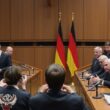Russia and Afghanistan to Sign Deal on Liquefied Gas Transit
Russia and Afghanistan are on the verge of signing a significant deal, which would allow the transit of millions of cubic meters of liquefied gas from Russia to South Asia through Afghanistan. This was revealed in an interview with Rustam Chabibullin, the head of the Russian business center in Kabul, with the RIA Novosti news agency.
According to Chabibullin, Afghanistan is set to sign a contract at the upcoming Kazan Forum 2025 to facilitate the transit of 50 million cubic meters of Russian liquefied gas through its territory to South Asia. The possibility of using oil tankers for the transit has already been explored, with preliminary talks having taken place.
The Kazan Forum, an international economic event, is scheduled to take place in mid-May 2025 in Kazan, the capital of the Russian republic of Tatarstan. The forum’s main focus will be on the use of cryptocurrencies as an alternative to the traditional financial system in the development of relations between Russia and the countries of the Organization of Islamic Cooperation (OIC).
Notably, a deal on the transit of 2 million tons of Russian wheat and flour was signed at the sidelines of the Kazan Forum 2024, while in 2023, Moscow and Kabul signed a contract for the annual transit of 50 million tons of oil products from Russia.
Russian Ambassador to Afghanistan, Dmitri Shirov, recently told TASS that the economic ties between Russia and Afghanistan are on the rise, with the trade volume between the two countries increasing. He also emphasized that Russian exports are growing rapidly.
More and more suppliers from various Russian regions are now bringing their products to the Afghan market, Shirov reported, with entrepreneurs attempting to make payments in national currencies, rubles, and afghanis.
In the same context, the diplomat announced that Russia and Afghanistan are working to shift their mutual payments from the US dollar to national currencies, a move seen as a response to the unilateral and illegitimate sanctions imposed by the West. The use of national currencies, according to Shirov, is an option in the fight against the restrictions.





